
 |

|
|
|
|
No marriages Siblings: Norah (1870 - ), Samuel Albert (Oct 12. 1872 - Nov 22. 1941), married to Lida Grace Detrick, children Robert & Barbara. Eleanor aka "Nell(ie)" (Jan 1875 - 1964) married to Edward Davidson, daughter Margaret (1911 - 1913) |
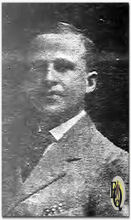 |
|
Above right: By February 1907 Robert W. Strauss was appearing in the theatrical production The Matchmakers with Dan Sully. |
|
|
Robert W. Strauss was born in March 28. 1879 in Chattanooga, Tennessee as youngest of 4 children to Samuel (a bookkeeper and son to a German immigrant) and Tennessee B. Browning aka Tennie (daughter of Squire I. J. Browning and Clara Everett aka Caroline Crouch). Bobby attended Second District school, City High and Chattanooga's Baylor's University school. While in school, young Strauss directed and had leading roles in The Guilded Fool, and in Charlie's Aunt, both of which were extremely popular. He went on on to Lehigh university (Class of '04) to study mining engineering. Robert aka "Shorty" was not only member of the dramatic club but also the Mandolin Club (playing first mandolin) and soon became too interested in theatricals instead of rocks and minerals. He once was employee in the Southern Express company's local office in Chattanooga. After he left Lehigh he went to New York in 1903, studying the drama under Rachel Crothers and John Mason. His first New York appearance was as an extra in Camille (Harlem Opera House - Garrick Theatre - Hudson Theatre, Apr 18. - May 1904), starring Henry Miller and Margaret Anglin. |
|
| James Young and vaudeville | |
|
As of 1906 (into 1907) Robert W. Strauss was appearing in the theatrical production The Matchmaker with the Dan Sully Co. He also appeared with such well known actors as Louis Mann and James Young. When the graduation took place in Baylor's University school (corner of Vine and Palmetto streets) on May 27. 1907 several alumni were invited. Robert W. Strauss, who by then had made quite a name in the theatrical world, gave a recitation.
It was with James Young he made his first professional
appearance in Chattanooga in
Brown of Harvard during the 1908 season. It was at the really fine Eleventh Street Theater
that at first bore the name of Schubert. |
|
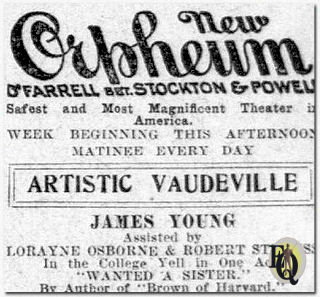 Later that same month, the company also tried out another skit Wanted - a Sister again written by his wife (some called it a condensed version of Brown of Harvard) it featured James Young, Robert Strauss and, initially, Lorayne Osborne for the female part. |
|
|
"James Young in 'Wanted—a Sister', appeared on Fifth Avenue. Mr. Young was billed alone for this vaudeville skit, but in justice to the others it would be better to bill the three names. Clara Kimball* as the sweetheart showed a refreshing personality and acted quite naturally. Robert Strauss, as the roommate, showed up the best in the act. His actions and manner of speaking lines being very funny." (The New York Dramatic Mirror, Jan 22. 1910). There are confirmed performances as late as August 1912. In March 1910 famous French-born American actress Valérie Bergère performed in The Lion Tamer, by Edward Weitzel, and Robert Strauss, Theodore Doucet, Lawrence Morten, Emma Campbell and several supported her. Strauss famed for his work with James Young was promptly hired by Bergère to play the call boy. A special scenic costume and prop production was made, which promised to be one of the biggest acts of it's kind in vaudeville. Wanted - A Sister was performed by James Young and Company (Fifth Avenue, Mar 19. 1910) and was described as a silly, far-fetched piece that was poorly developed and almost as badly acted. When a college student flirts with a girl in a restaurant, he is caught by his girlfriend, Evelyn (Alice Riker). In order to give his roommate Tom Brown an alibi, Robert Strauss, as "Bunch" Andrews, dresses up as the "sister". Strauss plays the part too well for the comfort of the jealous girlfriend. In the end he exposes the whole thing by losing his blond wig and is chased into the street where he is arrested for impersonating a woman. |
|
| "Robert Strauss and Players" | |
|
In Chicago, the latter part of August 1910 Robert engaged James Ross and Lawrence Sparks for his new vaudeville sketch Wanted, a Cook, which opened on the interstate circuit. |
|
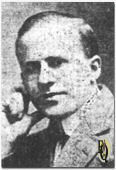 By October 1910 "Robert Strauss and Players" performed (with a
skit called
Petticoats) under management of
Valérie Bergère. He continued
this at least until March 1913. In 1911 Mr. Strauss featured his own
production Beaten Biscuit, a farcial story of college life,
(Airdome Theater,
Princess Theater Youngstown).
In August 1912 he also reprised Wanted, a
Sister with Young and Clara Kimball and two playlets A Hypnotic
Spree, his own production and Of All the Nerve by H.S.
Chamberlain Jr. By October 1910 "Robert Strauss and Players" performed (with a
skit called
Petticoats) under management of
Valérie Bergère. He continued
this at least until March 1913. In 1911 Mr. Strauss featured his own
production Beaten Biscuit, a farcial story of college life,
(Airdome Theater,
Princess Theater Youngstown).
In August 1912 he also reprised Wanted, a
Sister with Young and Clara Kimball and two playlets A Hypnotic
Spree, his own production and Of All the Nerve by H.S.
Chamberlain Jr.
|
|
|
Robert Strauss and company (Lawrence Sparks and Jack/John Keane) toured the sketch Landing a Contract (Proctor's Fifty-Eight Street, Oct 12. 1912) (Colonial, Richmond, Nov 5. 1912), (Orpheum Birmingham, Dec 1. 1912). Landing a Contract was given an ovation at Garrick Theatre, Wilmington, Roberts hometown, on Oct 28. 1912. On May 10. 1913 his father Samuel Strauss died in Chattanooga, Tennessee. Julia Neville organized as stock company to play at the Lyric Theatre in Chattanooga under the name of the Julia Neville Players. Bobby Strauss was a member. Their opening play was The Rejuvenation of Aunt Mary (January 1914). Martin J. Dixon leased the Hart's Family theater, Philadelphia for 10 weeks to install a stock company with both Bob Strauss and Julia Neville in the cast. For it's opening play on Oct. 18 1914 "the home of sensational melodramas" brought The Game of Life, which was followed the next week by The Eleventh Hour. |
|
| World War I | |
|
Robert was back in Chattanooga when the United States entered
the first World War. He enlisted in the infantry in 1917 and was commissioned a
first lieutenant at Fort Oglethorpe. He was with combat troops as first lieutenant of Company
K, 323rd Infantry, (the famous Wildcat Division) when he was cited for
gallantry in action. On November 10. 1917, southeast of Verdun, his platoon
reached its objective although under heavy fire for hours, and Lieutenant
Strauss was cited for extraordinary gallantry. During the Christmas Season 1917 he was quarantined in Camp Jackson, Columbia, S.C. due to an outbreak of meningitis in the camp. After the Armistice, Lieutenant Strauss organized a group of entertainers and was assigned to a tour of duty with troops who remained in France. |
|
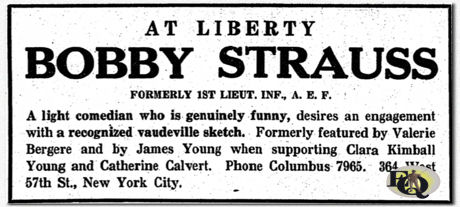 Above: Add for Bobby Strauss "At Liberty" in Variety September 1919. |
|
|
His mother passed away on March 17. 1919 in Chattanooga. He did not see his native land again until 1919 when he became engaged for Rachel Crothers' comedy The Little Journey (Majestic Theatre, Dec 1. 1919), with Fritz Leiber. Lieutenant Bobby Strauss revived his old comedy sketch, Landing the (sic) Contract, which he had performed seven years earlier (Feb 1920). |
|
| Shakespeare and Fritz Leiber Sr. | |
|
In a Chautauqua play called Nothing but the Truth he played Wilkie Collins' old role and in The Merchant of Venice (Dec 1920) Leiber played Shylock while Strauss was Launcelot. The beginning of a long collaboration for the Shakespeare company Fritz Leiber & Co. Fritz Leiber Sr. who had played for a long time played in support of Shakespearean actor Robert Mantell, surrounded himself with a cast highly experienced in Shakespeare's work. This enabled them on tour to stage many different Shakespeare plays within a week. On one day, they often performed different productions during the afternoon and evening shows. An example of such a schedule at the Shubert-Garrick theater in Washington D.C. :
Macbeth (Dec 13. & 16. 1920), The company included Fritz Leiber, Louis Leon Hall, John C. Hickey, John Burke, Wallis Roberts, Joseph Singer, Arthur Row, Sidney Elliott, Robert Strauss, James Hendrickson, Katherine Sayre, Harold Rand, Irby Marshall, Virginia Bronson (Fritz Leiber Sr.'s wife) and Pauline Crell.
It's reported they played to over 40 000 people when the company played Broadway in the Lexington Theater (Dec 1920 - Jan 1921) after which they took back to the road: Minor changes to the company which in Broadway included Fritz Leiber, Louis Leon Hall, John C. Hickey, John Burke, Wallis Roberts, Joseph Singer, Arthur Row, Sidney Elliott, Robert Strauss, Frederick Drake, H. Portercliffe, James Hendrickson, Katherine Sayre, Harold Rand, Irby Marshall and Virginia Bronson (Fritz Leiber Sr.'s wife). Hamlet, Romeo and Juliet, Macbeth (Washington Theatre, Richmond, April 13. & 14. 1921)... During the summer of 1921 Strauss rejoined Fritz Leiber to head back home afterwards. In the fall Fritz Leiber took his company, under management of George Ford, on a journey through the principal cities of the South:
Hamlet, The Merchant of Venice, Romeo
and Juliet, Richard III
(Court Theater Wheeling, WV, Sep 15. - 17. 1921), After which during the Holidays the company entered New York City to open their annual engagement at the Lexington Theater. Now a permanent member, Robert played a series of Shakespeare plays:
Macbeth (Dec 26. 1921 - Jan 6. 1922, 3
x) as a drunken porter, Bobbie Strauss was known to play the mandolin backstage. With the same identical cast as in it's New York run Fritz Leiber went on tour. The full sequence of plays (see above) was repeated in the Montauk Theater starting on January 9. 1922 with Macbeth. At one time a 1922 advertisement boasted that after the transcontinental tour they intended to go to London, Continental Europe and the Orient. The company now included Fritz Leiber, Olive Oliver, Virginia Bronson (Fritz Leiber Sr.'s wife), Louis Leon Hall, John Burke, Robert Strauss, James Hendrickson, Richard Allen, Caroline Kohl, Constance Kingsley, Philllip D. Quinn, Frank Howard, W. Leonard Gordon, Justin Adams, Waldron Smith, Blanche Chapman, Alma Lind, and others. After which, the company took to the road again:
The Taming of the Shrew, Macbeth, Othello, Romeo and Julia, Hamlet, Julius Caesar, The Merchant of Venice, Othello
(The Grand Opera House Cincinnati, Jan 29. - Feb 4.
1922), |
|
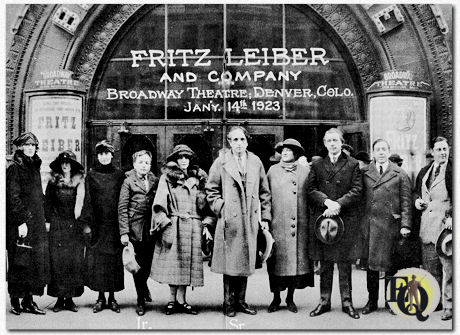 Above: Fritz Leiber Jr. played for two seasons in his father's company: once in 1923 (just after graduating from high school) and again in 1934 (two years out of college). In the 1976 Journal of the H.P. Lovecraft Society No.1, Fritz describes this photo, which originally included 24 people standing in a semicircle in front of the theater. From left to right, the identified individuals are: three unknown female actors, Fritz Strauss Jr., Virginia Bronson (his mother), Fritz Strauss Sr. (his father), an unknown actress, John Burke (holding his hat), Joe Singer (with an intense gaze), and Louis Lean Hall (holding a pipe). Possibly outside the cropped photo, down the row, were his Chicago aunt Marie and, in the other direction, George Ford, the company director. At one end are the three stagehands who traveled with the company: the property man, the electrician, and the carpenter. The rest were actors, including the balding Alexander Andre. |
|
| Theater | |
|
In Roseanne (Greenwich Village Theatre, Dec 29. 1923 - Feb 1. 1924) all the characters were "colored folk", Strauss played Alec Gray. Back home in 1924 he played a production on the Chautauqua circuit with Dorothy Ellen Cole. Ethel Bennett produced several traveling companies for the Redpath Circuit. One company, which included Robert Strauss, played Six Cylinder Love they opened April 23. 1924 in Dalton, Ga. and played seventeen weeks. The Book of Charm aka Charm (Comedy Theater New York, Sep 3. - Oct 1. 1925) had Strauss playing Doctor Garfield. John Kirkpatrick's play Charm (Shubert-Belasco, Washington D.C. , Feb 22. 1926) with Elizabeth Patterson, Maidel Turner, Kenneth Dana & Robert Strauss was about a girl who wants to leave her small home town to go to New York. After careful considerations the parents and the local boy who loves her decide that the best thing to do is to keep her at home and to bring the metropolitan customs to the small town. |
|
| Fritz Leiber again | |
|
Comedy roles in a number of successes followed, but also Shakespearian roles. He initially joined the company of that other great Shakespeare interpreter Robert B. Mantell. Which worked and performed in pretty much the same way as Fritz Lieber did. The company consisted of: Robert Mantell, Genevieve Hamper, Sarah Alexander, Mark Glover, John Burke, Bruce Adams, John Alexander, Frederic W. Hile, Robert Strauss, John C. Hickey, Edwin Foss, John Forrest, James Hendrickson, Robert Fulton, James Betterton, Charles Kent, Gilbert Sens, Abraham Ivory, Olga Leeds, Mary Glover, Claire Bruce, Lillian Remer, and Glen Waters.
The Merchant of Venice, Julius Caesar, As You like it
and Macbeth (Utica theater, Oct 18.- 20. 1926), In the end he found he way back to the Fritz Leiber & Co.:
Macbeth, Romeo and Juliet (Arlington Theatre Boston,
Oct 10 - 12. 1927),
Robert Strauss related that one night while playing in
Chicago, the press representative of the company strolled back on the stage
and greeted him with the usual, “Well what do you know?” In March 1928 Strauss re-appeared "completely pleasing" in The Merchant of Venice (Shubert Theatre) again as Launcelot Gobbo and that same year he was remarked for his creation of a "cobbler" in Julius Caesar. Hamlet, Macbeth (Strauss as porter and third Witch), Romeo and Juliet and The Taming of the Shrew (Indianapolis, Feb 1929),
Chicago Civic Shakespeare Society started
on Nov 11. 1929 with Leiber in the title role of Hamlet in Chicago. Hamlet, Richard III, The Merchant of Venice, Twelfth Night, Othello, King Lear, As You Like It, Julius Caesar (Shubert Alvin Theatre Pittsburgh, Feb 3. - 9. 1930), Hamlet, King Lear, Othello, Twelfth Night, The Merchant of Venice, Julius Caesar, As You Like It and Richard III (Poli's, Washington D.C., Feb 15. - 21. 1930), A two week "Gala Repertoire of Shakespearean Plays" including King Lear, with Strauss as "old man", (Shubert Wilbur Theatre Boston, Mar 17. 1930). Moving on to New York where they presented a series of Shakespearean plays at the Sam S. Shubert Theatre. Fritz Leiber headed the company which also included William Courtleigh, John Burke, Robert Strauss and others:
Hamlet (Mar 24. - Apr
12. 1930) as gravedigger, The company performed another New York series at the end of that year but this time at the Ambassador Theatre:
King Lear
(Dec 25/27 & 31. 1930) as old man, The Chicago Civic Shakespeare Society then went on tour, appearing, amongst others, in Chicago and Washington, D.C. (Poli’s Theatre), ... By now Robert Strauss, however, was trying out a different field... |
|
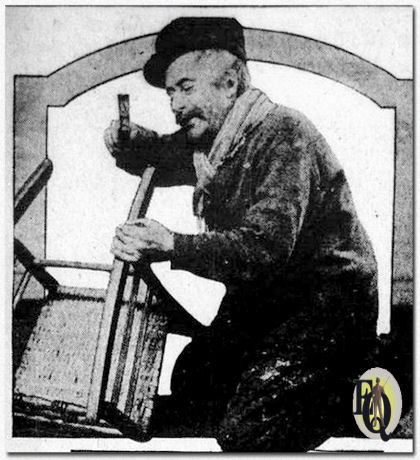 Above: Here we have "Inchy Spencer", played by Robert Strauss in the Stebbins Boys sketches, caught in a rare moment of activity. Inchy is proving one of the most popular characters in this nightly entertainment from WJZ. Followers of the series find Inchy's earnest effort to avoid work mighty interesting. Strauss also portrays the part of "Pink Freeze" in Lulu Volmer's Moonshine and Honeysuckle a weekly NBC presentation. (Apr 19. 1932) |
|
| Radio | |
|
An early radio enthusiast, he entered that field and was soon writing his own skits and appearing in sustaining programs. Strauss was a familiar voice in quiet a few radio dramas from the 1930s amongst them Buck Rogers in the 25th Century (CBS), ... . In 1932 he took the part of "Inchy Spencer" in The Stebbins Boys sketches on the radio. Parker Fennelly and Arthur Allen played their familiar roles of cantankerous old-timers with hearts of gold beating beneath grim exteriors. The cast was as follows: Esley Stebbins (Arthur Allen), John Stebbins (Parker Fennelly), Hobble Stevens (Harry Humphrey), Virginia Pennypacker (Adeline Thomason), and Inchy Spencer (Robert W. Strauss). On the Eno program (Apr 25. - 26. 1933) the part of Tobias Winslow was played by Robert Strauss, Meeker by Junius Matthews, Yeager by Walter Soderling and Eddie Jackson, the newspaper photographer by himself. |
|

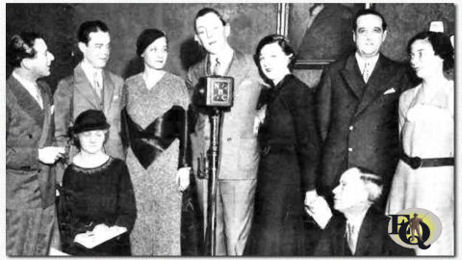 Above: Cast of Moonshine and Honeysuckle Stanford, Ben Lackland (David), Theresa Whittler (Gypsy). Louis Mason (Clara), Ann Elstner (Cracker) Bradley Barker (Len Boyd and "Bones") and Sara Haden (Piney). Seated: Lulu Vollmer and Robert Strauss (1933). |
|
In the cast of Moonshine and Honeysuckle (NBC, 1933 -1936). (see above) Robert Strauss played Pink. Author Lula Vollmer, whose Moonshine and Honeysuckle ran for two years as a weekly radio dramatization returned to the air in 1934 with a serial comedy-drama of mountain folk Grits and Gravy. The episodes, described the adventures of Cahe Crump, a moseying, happy-go-lucky mountaineer who "gets the call" to be a preacher. With Cahe will be his wife, Sugar a son Lips, and other typical characters. Robert Strauss, himself a native of the Tennessee mountains had the lead role. Others in the cast are Marjorie Mayne, William Anthony Janney, George Gaul, Fred Stuart and Peggy Paige. Bob Strauss also played Nappy Beagle in Lulu Vollmer's Southern Mountaineer sketch/serial The Widow's Son (1935 - 1936). In 1936 following the success on radio Moonshine and Honeysuckle was also performed in theatres, directed by the author, Lulu Vollmer, it featured Robert Porterfield, Robert Strauss and Theresa Whittler in the cast. When the new play Having a Wonderful Time opened at the Lyceum in New York on February 20. 1937, Bob Strauss had a minor part as one of the Berkshire camp guests, also known as "the hillbillies of the Bronx." By March 29. 1937 Our Gal Sunday was announced as a new dramatic series based on the play in which Ethel Barrymore delivered her famous line "That's all there is, there isn't any more!". It was to be heard Monday through Fridays from 12:45 to 1:00 PM. The sketches described the adventures that befell a young orphan girl and her two old guardians who devoted themselves to guiding her life in the environment of a modern mining town. Evelyn Abbott appeared in the title role. Robert Strauss and Jay Jostyn were heard in the roles of miner "Lively" and "Jackie," respectively. Our Gal Sunday was broadcast on CBS from 1937 to 1959 Mrs. Wiggs of the Cabbage Patch premiered on CBS February 4. 1935. The soap moved to NBC a year later and ended production on Dec 23. 1938. Between 1936 and 1938 Strauss got a recurring role as "Pa Wiggs". CBS wound up it's Shakespeare Cycle with "Twelfth Night" (CBS, Aug 30. 1937) and a star studded cast: Tallulah Bankhead, Helen Menken, Cedric Hardwicke, Orson Welles, Estelle Winwood, Robert Strauss, Burford Hampden, Ray Collins, Sydney Smith and Mark Smith. Eugene O'Neill presented 4 dramas in The O'Neill Cycle (NBC-Blue). The second play "Beyond The Horizon", with Margale Gillmore & James Meighan was described as being "a standout", although Robert Strauss "overdid the age of the uncle". On August 16. 1937 they presented "Where the Cross is Made" supported by Parker Fennelly, Helen Choat and Robert Strauss. When radio's The Adventures of Jungle Jim restarted in August 1937 Ed McDonald and Bob Strauss were new members of the cast. In 1935 Hillbilly Heart-throbs (which premiered on May 22. 1933 aka Heart-throbs of the Hills) became Dreams of Long Ago (NBC Nov 6. 1935 - Nov 30. 1938) it was a drama based on old folk songs and was presented like a musical play. Starting October 10. 1937 Robert played about 20 episodes, the last one on October 9. 1938. When Casey Jones (Fulton Theatre, Feb 19. - Mar 1. 1938) was performed on Broadway by the Group Theater it's cast included Van Heflin, Charles Bickford (als Casey) en Strauss as "Jones", Elia Kazan directed. Still unmarried, in 1938, he purchased a home on the Cold Spring - Carmel Road about one quarter mile from Mckeel's Corners and made extensive alterations. Yankee Fable, the Lewis Meltzer comedy play (National Theater, D.C. Oct 31. - Nov 5. 1938) with Ina Claire and Henry Daniell in the lead had Robert Strauss as a part of the supporting cast. |
CBS broadcasted a 15 minute adventure called
Howie Wing. Howie (1938) was a daring young air ace with the Cadet Aviation
Corps who later became co-pilot for Capt. Harvey, the owner of a South
American airline. In January,
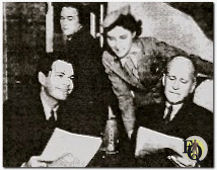 1939,
Kellogg promoted Howie Wing by arranging the first dramatic
broadcast in radio history made from an airplane, Howie Wing, a Saga of
Aviation. (Jan 20. 1939). The cast included:
William Janney (Howie Wing); Mark Parker (Donna Cavendish); Neil O'Malley (Capt.Harvey);
Robert Strauss (Typhoon Tootel); Raymond Bramley (Burton York).
Typhoon nears his half -century birthday, but he's still
tops as a mechanic. He served under Harvey in the War, and has stuck closer
than a brother ever since, even though the captain has tried to shake him
off. As a new character in he furnishes the comedy relief in the show. 1939,
Kellogg promoted Howie Wing by arranging the first dramatic
broadcast in radio history made from an airplane, Howie Wing, a Saga of
Aviation. (Jan 20. 1939). The cast included:
William Janney (Howie Wing); Mark Parker (Donna Cavendish); Neil O'Malley (Capt.Harvey);
Robert Strauss (Typhoon Tootel); Raymond Bramley (Burton York).
Typhoon nears his half -century birthday, but he's still
tops as a mechanic. He served under Harvey in the War, and has stuck closer
than a brother ever since, even though the captain has tried to shake him
off. As a new character in he furnishes the comedy relief in the show. |
| Above right: In January, 1939, Kellogg promoted Howie Wing by arranging the first dramatic broadcast in radio history made from an airplane, Howie Wing, a Saga of Aviation. (Jan 20, 1939) (L to R) Bill Janney (“Howie”), sound effects man Alexander Binnie, Helen Jacobson was the stewardess and actor Robert Strauss on an unspecified United Airlines airplane, January 20. 1939. |
|
The Magical Key (Blue) was a musical variety show which on June 11. 1939 had the comedy sketch "The Tridget of Greva" with Parker Fennelly, Mark Smith and Bob Strauss. In 1939 George Zachary, a young executive at CBS was playing with the idea of an hour long detective where the listeners could match their wits with the leading character in solving the riddle before he could. Fred Dannay & Manfred Lee provided the scripts for the hour long Adventures of Ellery Queen (CBS, Jun 18. 1939 - Feb 18. 1940). Robert Strauss played the part of Doc Prouty during this first season. To prevent the plot leaking out Zachary would keep the final part a secret even to the actors who played in it. At the last dressed rehearsal all was revealed and it didn't take long for the actors to organize a pool, the winner being the one who unmasked the culprit. Ted de Corsia (Velie) and runner-up Robert Strauss were the most frequent winners.
Bobby Strauss replaced Parker Fennelly as Lem Stacy on
Your Family and Mine (NBC,
Aug 22. 1939 - Apr 26. 1940). |
| Suicide by intent |
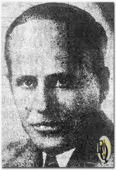 Robert W. Strauss was found dead from carbon-monoxide gas in his
car in the garage in the morning of November 11. 1940 by the caretaker of the
estate Charles Harmon.
Harmon last saw Strauss Saturday afternoon and discovered the body when he
returned to work. Robert Strauss had been living there alone for about one year and a half.
Three notes were left by Mr. Strauss, giving
financial reverses as the reason for the suicide.
One was addressed to Mr. Harmon, giving instructions for the care of the
place; another had instructions to call the coroner, and the third was a
note to his
family in Chattanooga, Tennessee, where Strauss was born and lived most
of his life. Robert W. Strauss was found dead from carbon-monoxide gas in his
car in the garage in the morning of November 11. 1940 by the caretaker of the
estate Charles Harmon.
Harmon last saw Strauss Saturday afternoon and discovered the body when he
returned to work. Robert Strauss had been living there alone for about one year and a half.
Three notes were left by Mr. Strauss, giving
financial reverses as the reason for the suicide.
One was addressed to Mr. Harmon, giving instructions for the care of the
place; another had instructions to call the coroner, and the third was a
note to his
family in Chattanooga, Tennessee, where Strauss was born and lived most
of his life.Coroner David Cathcart, of Cold Springs, was called and Dr. Coryell Clark, medical examiner, who pronounced the man dead from carbon-monoxide poisoning. He is believed to have died on November 9. 1940. The coroner rendered a verdict of "suicide by intent", and gave a removal order for the body to Cunningham funeral parlor in Cold Spring, where the body was shipped to relatives in Chattanooga. He was buried there on November 14. with military honors. He was survived by a brother, a sister, both in Tennessee, two nephews, two nieces and a grandniece. |
|
Notes: * In the 1904 yearbook for Lehigh University, he is mentioned with the course abbreviation "Met." His residences are listed as 431 Cherokee St., South Bethlehem, and 418 Cherry Street, Chattanooga, Tennessee. He was an undergraduate member in 1904 (Delta Upsilon) and a member of the Lehigh University Mandolin Club (First Mandolin '04). ** Clara Kimball married James Young (his second wife) and became famous in the movies as Clara Kimball Young. All dates for movies are for the first US release. All dates for TV programs are original first airdates. All dates for (radio) plays are for the time span the actor was involved. Facts in red still need confirmation. |
|
Click on Uncle Sam if you think you can help out...!
|
|
Other references |
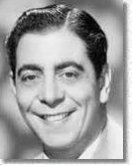 This actor profile is a part of
Ellery Queen a website on deduction.
The actor above played Doc Prouty in the first
radio series of The Adventures of
Ellery Queen.
Click Uncle Sam if you think you can help
out...! This actor profile is a part of
Ellery Queen a website on deduction.
The actor above played Doc Prouty in the first
radio series of The Adventures of
Ellery Queen.
Click Uncle Sam if you think you can help
out...! Many of the profiles on this site have been compiled after very careful research of various sources. Please quote and cite ethically! Previously it was wrongly assumed another actor by the same name (Robert Strauss) played this role. We also like to offer you his profile here (click on his picture for more....) |
|
Page first published on Sep 17. 2017 Version x2.1 - Last updated April 24. 2025 |
 b
a c k
t o L i s t o f S u s p
e c t s
b
a c k
t o L i s t o f S u s p
e c t s
|
|
| Introduction | Floor Plan | Q.B.I. |
List of Suspects | Whodunit? | Q.E.D. | Kill as directed | New | Copyright Copyright © MCMXCIX-MMXXV Ellery Queen, a website on deduction. All rights reserved. |